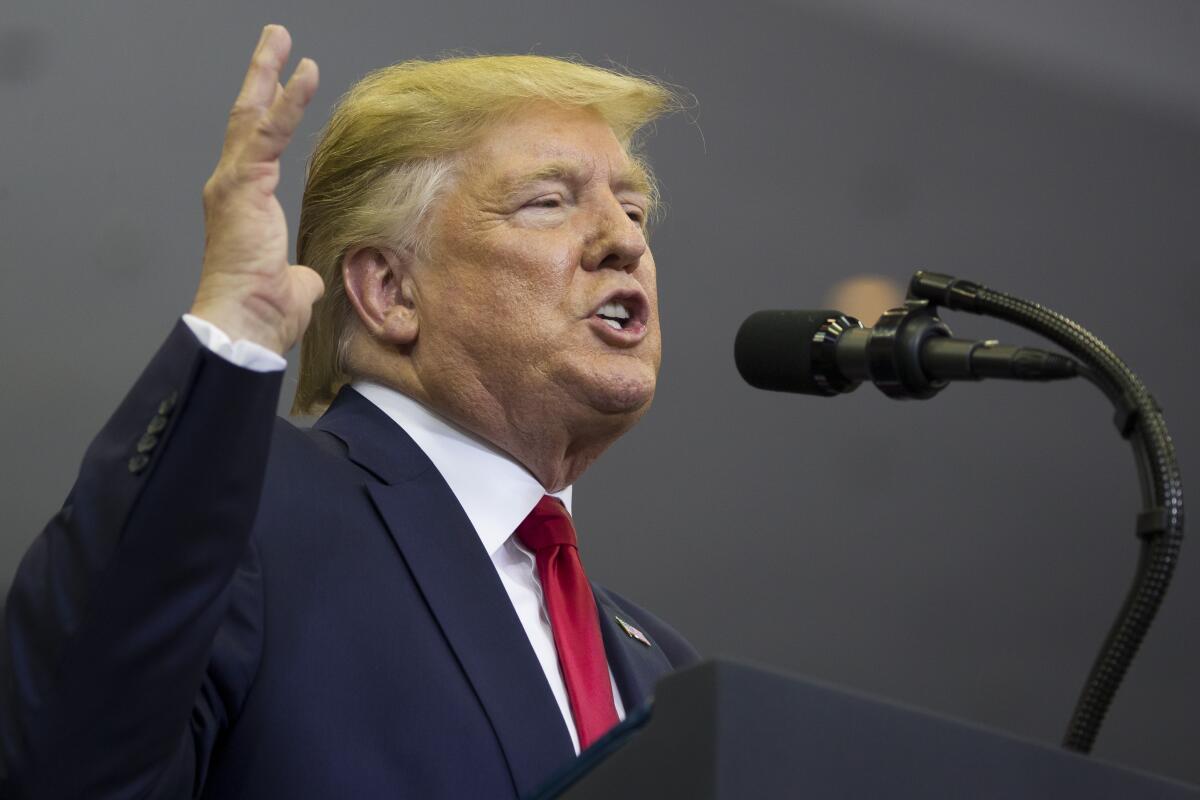Defense chief admits he ‘didn’t see’ evidence for Trump claim that Iran planned embassy attacks

- Share via
WASHINGTON — President Trump’s senior aides struggled Sunday to reconcile conflicting statements over the reasons for killing a top Iranian general, including Trump’s assertion that attacks were being actively planned against a quartet of American embassies.
At the same time, the White House walked a careful line over anti-government protests that flared for a second day in Tehran. Crowds there and in other major Iranian cities marched amid anger over the government’s admission that its forces accidentally downed a Ukrainian passenger jet last week, killing all 176 aboard, most of them Iranian.
In a round of interviews on news talk shows, top administration officials were eager to call attention to dissenting voices within Iran. But they also tried to avoid giving the impression that the demonstrations dovetailed with an American desire to undermine the Tehran government.
“You can see the Iranian people are standing up and asserting their rights, their aspirations for a better government — a different regime,” said Defense Secretary Mark Esper on CBS’ “Face the Nation.” But Robert O’Brien, the national security advisor, said regime change had “never” been the administration’s Iran policy.
O’Brien, appearing on ABC’s “This Week,” said Iranian authorities were “having a very bad week” after denying and then acknowledging responsibility for shooting down the passenger plane. The strike came a few hours after Iran fired ballistic missiles at a U.S. base in Iraq in retaliation for the U.S. killing of Iranian Gen. Qassem Suleimani outside Baghdad’s airport.
“This is a regime that’s reeling from maximum pressure, they’re reeling from their incompetence in this situation, and the people of Iran are just fed up with it,” O’Brien told ABC.
Trump, who has been tweeting Farsi-language support for “the brave Iranian people,” took an admonitory tone toward Iranian authorities on Sunday with an all-caps warning on Twitter: “DO NOT KILL YOUR PROTESTERS.”
“The World is watching,” the president wrote. “More importantly, the USA is watching.”
But with questions mounting about the decision-making behind the targeting of Suleimani, senior administration officials floundered in the face of pointed questions about the legal justification for the action.
Officials have repeatedly cited an “imminent” threat from Suleimani, and Trump suggested in a Fox News interview Friday that the general was readying attacks on four U.S. embassies in the region.
“I believe it probably would’ve been four embassies,” Trump told Fox interviewer Laura Ingraham.
No other officials have backed up the assertion from Trump, who frequently fabricates details to embroider his accounts of events. Congressional Democrats said no such intelligence was relayed to them in briefings last week.
Esper and O’Brien, in a series of television appearances, refused to directly repeat the president’s assertion, although they tried to avoid directly contradicting him.
“I didn’t see” any specific intelligence regarding attacks on four embassies, Esper conceded, but he declared that “I share the president’s view” that the diplomatic posts were “probably” a target.
O’Brien took a similar stance, telling NBC’s “Meet the Press” the intelligence showed “they were looking at U.S. embassies throughout the region.”
But he declined to detail imminent threats against any diplomatic installation other than the American Embassy in Baghdad, whose gates were breached on New Year’s Eve by protesters aligned with a pro-Iranian militia.
“I’d love to have the intelligence out there,” O’Brien said. “Unfortunately, if we declassify it, we could end up losing that stream of intelligence.”
The episode was reminiscent of Trump aides’ efforts last week to dismiss or minimize the president’s threat to strike Iranian cultural sites — an action that would likely have constituted a war crime — even as the president himself amplified his original remarks.
Trump finally backed down, saying that “I like to obey the law,” and there’s been no evidence that any Iranian cultural sites were targeted.
Frustrated Democrats said they were well aware of the need to avoid disclosing sources and methods for intelligence reports, but accused the administration of providing an incomplete or outright misleading picture of the factors that allegedly made it imperative to kill Suleimani as a matter of self-defense.
“In the classified briefing, we got less detailed information than President Trump shared with Laura Ingraham,” said Sen. Chris Coons of Delaware, interviewed on “Fox News Sunday.” That assertion was echoed by Rep. Adam B. Schiff (D-Burbank), the head of the House Intelligence Committee.
On CBS’ “Face the Nation,” Schiff said there was “no discussion” in briefings with the so-called “Gang of Eight” — the chairs and ranking members of relevant House and Senate committees and the House and Senate leaders — of four embassies being targeted. He accused Trump and Secretary of State Michael R. Pompeo of “fudging the intelligence” in public comments about the Suleimani strike.
The administration, Schiff said, is “overstating and exaggerating what the intelligence shows. And when you’re talking about justifying acts that might bring us into warfare with Iran, that’s a dangerous thing to do.”
More to Read
Sign up for Essential California
The most important California stories and recommendations in your inbox every morning.
You may occasionally receive promotional content from the Los Angeles Times.










